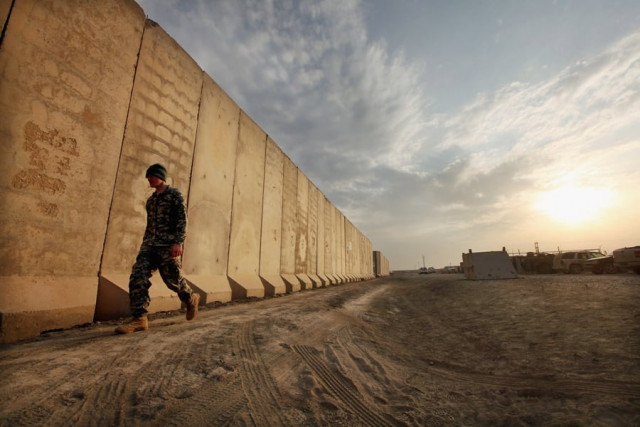Nearly nine years on, US withdraws from Iraq
War was launched in March 2003 with missiles striking Baghdad to oust dictator Saddam Hussein.

Nearly nine years on, US withdraws from Iraq
The war launched in March 2003 with missiles striking Baghdad to oust dictator Saddam Hussein is leaving behind a fragile democracy still facing insurgents, sectarian tensions and a struggle to define its place in the Arab region.
The final column of around 100 mostly US military MRAP armoured vehicles carrying 500 US troops trundled across the southern Iraq desert through the night along an empty highway to the Kuwaiti border.
"It's good to see this thing coming to a close. I was here when it started," Staff Sgt Christian Schultz said just before leaving Contingency Operating Base Adder, 300 km (185 miles) south of Baghdad, for the border. "I saw a lot of good changes, a lot of progress, and a lot of bad things too."
For President Barack Obama, the military pullout is the fulfilment of an election promise to bring troops home from a conflict inherited from his predecessor that tainted America's standing worldwide.
For Iraqis, it brings a sense of sovereignty but fuels worries their country may slide once again into the kind of sectarian violence that killed thousands of people at its peak in 2006-2007.
Prime Minister Nurial Maliki's Shia-led government still struggles with a delicate power-sharing arrangement between Shia, Kurdish and Sunni parties, leaving Iraq vulnerable to meddling by Sunni Arab nations and Shia Iran.
The intensity of violence and suicide bombings has subsided for now. But a stubborn Sunni insurgency and rival Shia militias remain a threat, carrying out almost daily attacks.
Iraq says its forces can contain the violence but they lack capabilities in areas such as air defence and intelligence gathering. A deal for several thousand US troops to stay on as trainers fell apart over the sensitive issue of legal immunity.
For many Iraqis security remains a worry - but no more than jobs and getting access to power in a country whose national grid provides only a few hours of electricity a day.
"We don't think about America... We think about electricity, jobs, our oil, our daily problems," said Abbas Jaber, a government employee in Baghdad. "They left chaos."
Going home
After Obama announced in October that troops would come home by the end of the year as scheduled, the number of US military bases was whittled down quickly as hundreds of troops and trucks carrying equipment headed south to the Kuwaiti border.
US forces, which had ended combat missions in 2010, paid $100,000 a month to tribal sheikhs to secure different parts of highways leading south to reduce the risk of roadside bombings and attacks.
At the height of the war, more than 170,000 US troops were in Iraq at more than 500 bases. By Saturday, there were fewer than 3,000 troops, and one base.
At COB Adder, as dusk fell before the departure of the last convoy, one group of soldiers slapped barbecue sauce on slabs of ribs brought in from Kuwait and laid them on grills alongside hotdogs and sausages.
The last troops flicked on the lights studding their MRAP vehicles and stacked flak jackets and helmets in neat piles, ready for the final departure for Kuwait and then home.
"A good chunk of me is happy to leave. I spent 31 months in this country," said Sgt Steven Schirmer, 25, after three tours of Iraq since 2007. "It almost seems I can have a life now, though I know I am probably going to Afghanistan in 2013. Once these wars end I wonder what I will end up doing."
Neighbours keep watch
US and foreign companies are already helping OPEC member Iraq develop the vast potential of the world's fourth-largest oil reserves, but Iraq's economy needs investment in all sectors, from hospitals to infrastructure.
Iran and Turkey, major investors in Iraq, will be watching with Gulf nations to see how it handles its sectarian and ethnic tensions, as the crisis in neighbouring Syria threatens to spill over its borders.
The fall of Saddam allowed the long-suppressed Shia majority to rise to power. The Shia-led government has drawn the country closer to neighbouring Iran and Syria's Bashar al-Assad, who is struggling to put down a nine-month uprising.
Iraq's Sunni minority are chafing under what they see as the increasingly authoritarian control of Maliki's Shia coalition. Some local leaders are already pushing mainly Sunni provinces to demand more autonomy from Baghdad.
A dispute between the semi-autonomous Kurdish region and Maliki's central government over oil and territory rights is also brewing, and is a potential flashpoint after the buffer of the American military presence is gone.



















COMMENTS
Comments are moderated and generally will be posted if they are on-topic and not abusive.
For more information, please see our Comments FAQ